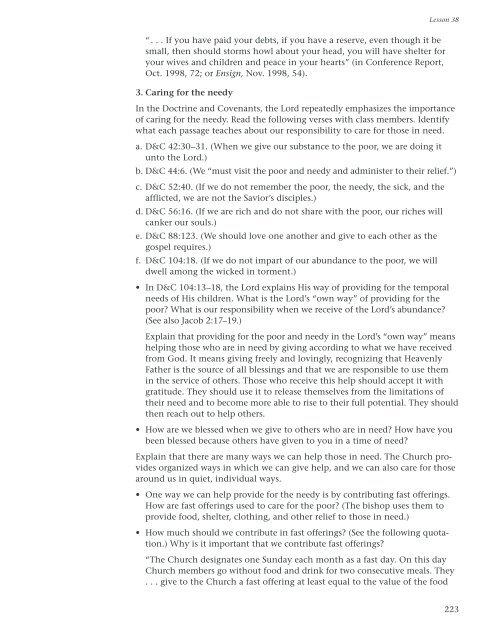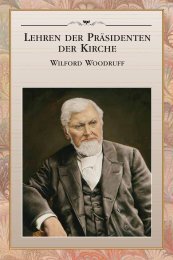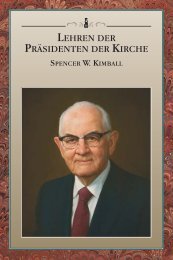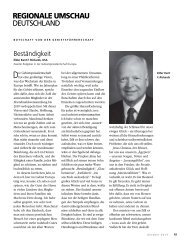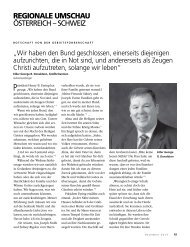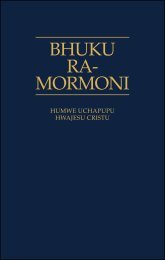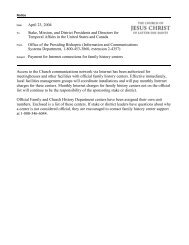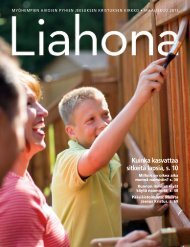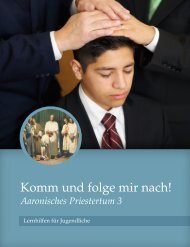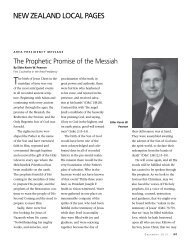Doctrine and Covenants and Church History Gospel Doctrine ...
Doctrine and Covenants and Church History Gospel Doctrine ...
Doctrine and Covenants and Church History Gospel Doctrine ...
Create successful ePaper yourself
Turn your PDF publications into a flip-book with our unique Google optimized e-Paper software.
“. . . If you have paid your debts, if you have a reserve, even though it be<br />
small, then should storms howl about your head, you will have shelter for<br />
your wives <strong>and</strong> children <strong>and</strong> peace in your hearts” (in Conference Report,<br />
Oct. 1998, 72; or Ensign, Nov. 1998, 54).<br />
3. Caring for the needy<br />
Lesson 38<br />
In the <strong>Doctrine</strong> <strong>and</strong> <strong>Covenants</strong>, the Lord repeatedly emphasizes the importance<br />
of caring for the needy. Read the following verses with class members. Identify<br />
what each passage teaches about our responsibility to care for those in need.<br />
a. D&C 42:30–31. (When we give our substance to the poor, we are doing it<br />
unto the Lord.)<br />
b. D&C 44:6. (We “must visit the poor <strong>and</strong> needy <strong>and</strong> administer to their relief.”)<br />
c. D&C 52:40. (If we do not remember the poor, the needy, the sick, <strong>and</strong> the<br />
afflicted, we are not the Savior’s disciples.)<br />
d. D&C 56:16. (If we are rich <strong>and</strong> do not share with the poor, our riches will<br />
canker our souls.)<br />
e. D&C 88:123. (We should love one another <strong>and</strong> give to each other as the<br />
gospel requires.)<br />
f. D&C 104:18. (If we do not impart of our abundance to the poor, we will<br />
dwell among the wicked in torment.)<br />
• In D&C 104:13–18, the Lord explains His way of providing for the temporal<br />
needs of His children. What is the Lord’s “own way” of providing for the<br />
poor? What is our responsibility when we receive of the Lord’s abundance?<br />
(See also Jacob 2:17–19.)<br />
Explain that providing for the poor <strong>and</strong> needy in the Lord’s “own way” means<br />
helping those who are in need by giving according to what we have received<br />
from God. It means giving freely <strong>and</strong> lovingly, recognizing that Heavenly<br />
Father is the source of all blessings <strong>and</strong> that we are responsible to use them<br />
in the service of others. Those who receive this help should accept it with<br />
gratitude. They should use it to release themselves from the limitations of<br />
their need <strong>and</strong> to become more able to rise to their full potential. They should<br />
then reach out to help others.<br />
• How are we blessed when we give to others who are in need? How have you<br />
been blessed because others have given to you in a time of need?<br />
Explain that there are many ways we can help those in need. The <strong>Church</strong> provides<br />
organized ways in which we can give help, <strong>and</strong> we can also care for those<br />
around us in quiet, individual ways.<br />
• One way we can help provide for the needy is by contributing fast offerings.<br />
How are fast offerings used to care for the poor? (The bishop uses them to<br />
provide food, shelter, clothing, <strong>and</strong> other relief to those in need.)<br />
• How much should we contribute in fast offerings? (See the following quotation.)<br />
Why is it important that we contribute fast offerings?<br />
“The <strong>Church</strong> designates one Sunday each month as a fast day. On this day<br />
<strong>Church</strong> members go without food <strong>and</strong> drink for two consecutive meals. They<br />
. . . give to the <strong>Church</strong> a fast offering at least equal to the value of the food<br />
223


